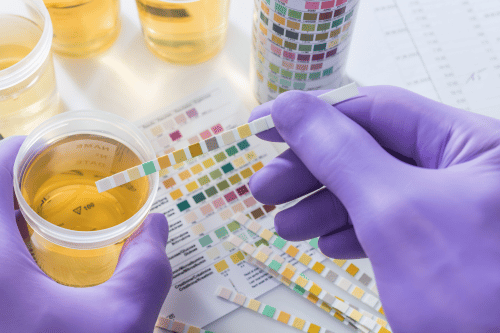

Psilocybin, the active compound found in magic mushrooms, has garnered significant attention for both recreational use and potential therapeutic applications. As society grapples with increasing drug use and public health implications, understanding psilocybin testing has become essential, particularly for drug tests aimed at identifying substance use. This blog explores how psilocybin tests work, the challenges they present, and how they differ from standard drug tests.
Psilocybin is a naturally occurring psychoactive compound found in certain species of mushrooms, commonly known as “magic mushrooms” or “shrooms.” When ingested, psilocybin is converted into psilocin, which interacts with the brain’s serotonin receptors, leading to altered perceptions, thoughts, and feelings.
A psilocybin test refers to drug tests designed to detect the presence of psilocybin or its metabolites, such as psilocin, in the body. One common method for detecting psilocybin is through a urine test, which can identify the presence of psilocin, a metabolite of psilocybin. These tests aim to determine recent consumption of magic mushrooms. However, identifying psilocybin through standard drug tests can be challenging because it metabolizes quickly into psilocin, which leaves the body relatively fast.
Most common drug tests—like urine drug tests—typically do not include psilocybin in their screening panels. Unlike amphetamines or opioids, magic mushrooms are not frequently tested for in routine testing. As a result, individuals may pass standard drug tests even if they have consumed psilocybin. Specialized tests are required to detect it.
Urine Tests:
Urine tests are the most common type of drug test used to detect substances. However, due to psilocybin’s short half-life, it is challenging to identify it unless the test is conducted within 24 hours of consumption. These tests focus more on metabolites like psilocin.
Blood Tests:
Blood tests can provide more accurate results, but they are invasive and often expensive. They are typically administered in forensic or clinical settings and are more effective when conducted soon after ingestion.
Specialized Lab Tests:
Labs can employ advanced testing methods to detect psilocybin, but these are less accessible and not typically part of employment-related drug screening.
Several individual factors influence how long psilocybin and its metabolites remain detectable:
Metabolism: A person’s metabolism plays a crucial role in the duration psilocybin stays in the body. Faster metabolism means the substance exits the system quickly.
Dosage and Frequency: Higher doses increase the chances of detection, especially if taken repeatedly within a short timeframe.
Urine Sample Quality: For urine drug tests, ensuring the sample is properly stored and processed is critical for obtaining accurate results.
Psilocybin has a short detection window. In most cases:
Blood Tests: Detect psilocybin within 24 hours of ingestion.
Urine Tests: Detect psilocin for up to 24 hours, though this varies depending on individual factors.
The testing threshold refers to the concentration level of a substance required to trigger a positive result. This threshold varies between different types of tests, with blood tests offering the most reliable results. Even when psilocybin is detected, results can be influenced by the timing of the test and the person’s metabolism.
For individuals undergoing addiction treatment, understanding test outcomes is vital. Accurate results help clinicians monitor substance use and tailor support programs accordingly. This is especially relevant for addiction recovery centers like Sullivan Recovery, where drug use screenings are essential for treatment planning.
Although standard drug tests do not usually detect psilocybin, the demand for specialized testing is rising as interest in psilocybin mushrooms grows. This shift is partially driven by increasing public concern about the potential risks of recreational use, including psychosis and other mental health complications.
Psilocybin drug test are not yet a part of standard drug screening procedures but play an essential role in specialized settings. While blood and urine tests can detect psilocybin for a short window, individual factors such as metabolism and dosage significantly affect detection accuracy. As research on magic mushrooms continues, testing methods may evolve, offering better tools for tracking use and aiding recovery efforts. For those seeking support for substance use, Sullivan Recovery provides comprehensive care that addresses the complexities of addiction and mental health.

At Sullivan Recovery, as an in-network provider we work with most insurance plans, such as:
And More
If you or a loved one are struggling with mental health challenges or substance abuse, reach out to Sullivan Recovery today. Our team of compassionate professionals is here to support your journey towards lasting well-being. Give us a call at 949-836-7180.
No, psilocybin is not typically included in standard drug tests, such as those for employment screening. Specialized tests are required to detect it, as most standard panels focus on substances like amphetamines, opioids, and cannabis.
Psilocybin has a short detection window. It can be detected in blood tests for up to 24 hours after ingestion and in urine tests if conducted within the same period. Individual factors, such as metabolism and dosage, also affect how long it remains detectable.
Psilocybin can be detected through urine tests, blood tests, and specialized lab screenings. While urine tests are commonly used for many substances, they have limited effectiveness for psilocybin detection. Blood tests are more accurate but are less frequently used due to their invasive nature.
Yes, Sullivan Recovery provides drug screenings as part of their addiction treatment and recovery programs. These screenings are crucial for creating personalized care plans and monitoring progress throughout recovery. If you need more information about specific tests, feel free to contact the center.